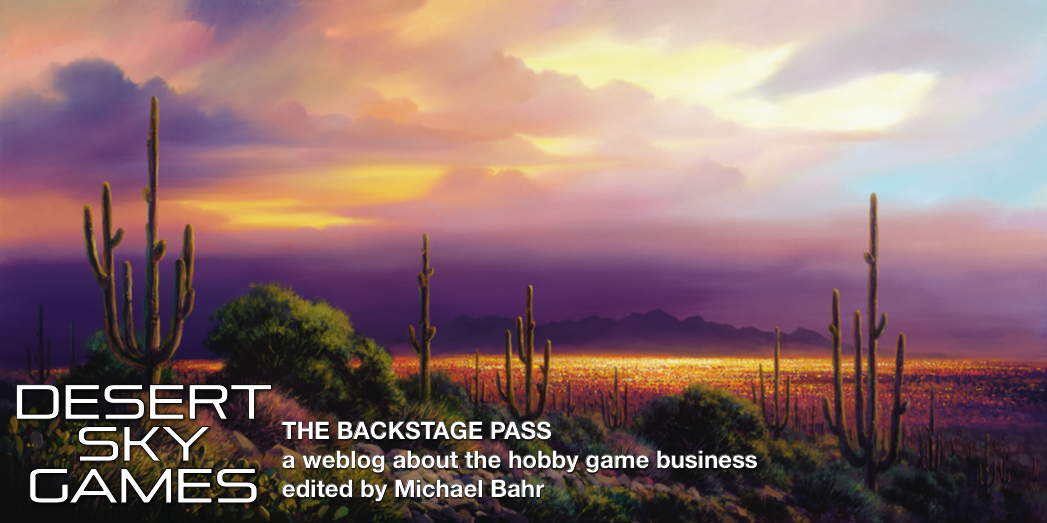It's about time for convention season again, and I'm seriously unsure whether or how much we want to participate moving forward. I mostly pulled the plug on this business component after last year's Phoenix Comicon debacle, but opportunity continues to knock at our door.
Three years ago conventions were like free money for us. The cost to deploy, staff, and depart, plus venue fees, was within the range where there was still plenty of meat on the bone after selling our stuff. But in 2016 and 2017 we mostly saw that get worse. Phoenix Comic Con (or Comic Fest, or whatever they have to call it now because of the San Diego Comicon trademark ruling) kept pushing table fees up into unsustainable territory. PCF's sister show, Fan Fest, wasn't cheaper enough to account for the lower level of attendance we saw, which was reflected in lower sales. And last year's PCC was a disaster due to the threat incident. We ended up passing on Fan Fest entirely.
This year we were offered a chance to participate extensively in PCF as they rebuild the show in the wake of 2017's trouble. Unfortunately, we didn't see it as economically feasible in the short term, and our long game right now is focused on maximizing our one mega-location.
We were given a second option to be present at PCF 2018 and vend our booth in a different part of the convention at a lower cost up front, a chance to cooperate with a longtime competitor for mutual benefit and maybe build some more positive history into that relationship. We're still working out the details for that, as of this writing.
But mostly, the large comic conventions are getting to a point where we would need to have a specific, tailored, home-produced asset of some sort to feature, in order to cut through the noise and leave a lasting impression, and most of all to make money. There's so much saturation and so much shovelware merch that even our eclectic curated offering doesn't quite cut the mustard. So options like Salt Lake Comic Con are just not really on our itinerary at this stage. Those shows don't really need yet another table full of Funko POPs and Pokemon booster packs.
Smaller festivals are much better on the base economics and staffing time needed, though sales are a greater gamble based on footfall. Six years ago, Wes Cleveland and a group of arcade enthusiasts started Zapcon as an annual April convention, which I've enjoyed as an attendee multiple times. In 2017, Wes opened up vendor offerings beyond the arcade collecting category, and I jumped at the chance to take part. DSG's booth performed reasonably well and most of all we were in front of a more focused audience, so outreach actually had some traction. At PPC we were just one more tchotchke dealer, but at Zapcon we were the main vendor of pop culture and tabletop goods, in addition to video game licensed merch and actual video games themselves. We return to Zapcon this coming weekend for the 2018 installment and I am excited.
There's another medium-scale local convention in the video game space, console expert John Lester's Game On Expo in August. It's fundamentally a good show. Two years ago it didn't go well for us as their tabletop offering had some logistical problems and we couldn't exactly pivot to video games because 80% of the dealers in the room were highly focused there. This may be a situation where we can participate again once we figure out the right mix of product, programming, and presentation.
We have a few microvending options, including a great local theater chain that lets us run a pop-up shop in their lobby when a major comic book or video game movie opens. For them it just adds to the party and is a marketing tool. For me, low venue fees and bounded hours of operation mean that my main cost exposure is low, and my worst case scenario is akin to handing out flyers at a sidewalk art festival. I also get plenty of contact from area schools and churches asking if we'd like to vend. It would be great to scale up offsite operations to the point where it makes sense to have a staff that works on that specifically.
That ties into the X-factor, which is: I will not be running the booth. As an autistic person I find it tremendously difficult and exhausting to do that kind of work, meeting people in an endless chaos and retailing on the fly. Some people thrive on that. Not me. Yes, in a moment of need I can step in, but it's foolish to put myself in that position in advance when other staff are going to do better at it... once I've developed personnel to that purpose, which means scaling to that level. I've been fortunate to have one particular manager who is great at this work, but he's about to relocate for his day job and I won't be able to feature him in this role after that.
I'll look back on this article at the end of the year. I wonder how things will unfold. DSG can reach an audience in this channel, but I'm not going to do it in a half-assed manner if the same amount of time and resources spent in the main storefront will provide a better ROI.


No comments:
Post a Comment